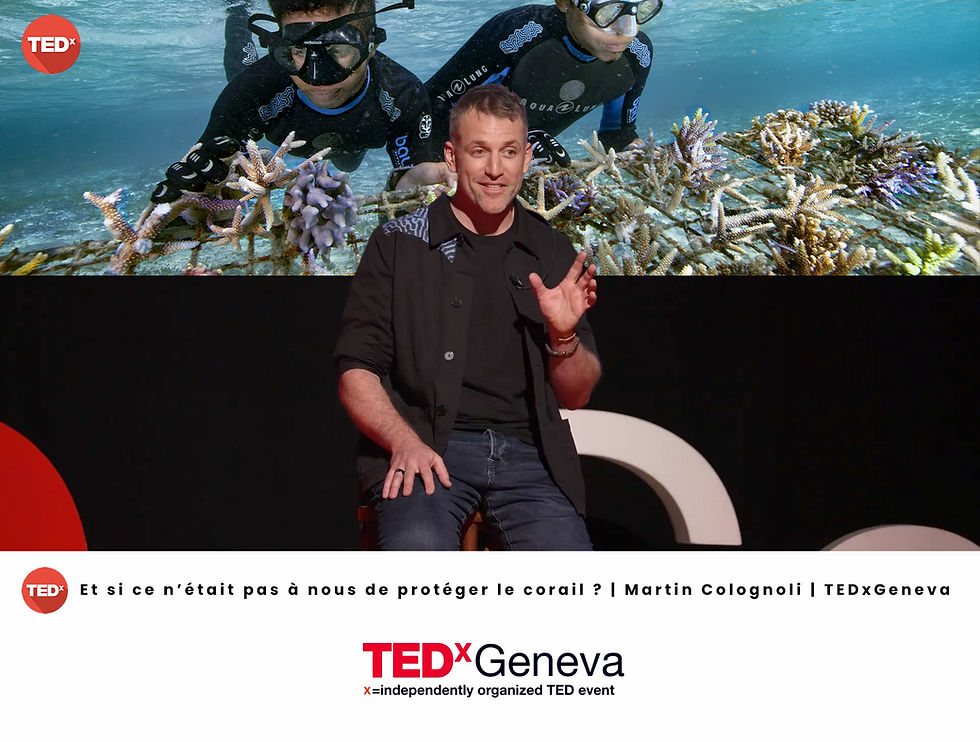How responsible tourism can help save coral reefs.
- Martin Colognoli

- Oct 21, 2024
- 4 min read
Updated: Nov 15, 2024

Introduction
Tourism is one of the main sources of income in coastal regions where coral reefs are found. Millions of tourists flock each year to admire the beauty and richness of these underwater ecosystems, whether for scuba diving, snorkeling or simply to enjoy the white sand beaches. However, mass tourism can also have a destructive effect on these fragile reefs. Fortunately, responsible tourism offers a promising solution to protect and preserve these ecosystems while continuing to generate economic benefits. This article explores how responsible tourism can play a key role in saving coral reefs.
1. The negative impacts of mass tourism on coral reefs
Unsustainable tourism puts considerable pressure on coral reefs. Some of the main destructive effects include:
Physical damage caused by visitors : Divers and swimmers can accidentally break fragile corals by walking on or touching the reefs. Some tourists even pick up pieces of coral as souvenirs, further degrading the reefs.
Marine pollution : Plastic waste, chemicals from sunscreens and wastewater from tourist facilities pollute the waters around the reefs. These pollutants harm the health of corals and marine species that depend on the reefs.
Coastal development : The construction of hotels, ports, and other tourist infrastructure often results in the destruction of coral reefs, alters ocean currents, and increases sedimentation, smothering corals with debris.
2. What is responsible tourism?
Responsible tourism is an approach to tourism that aims to minimize the negative impact of tourism activities on the environment while maximizing benefits for local communities and ecosystems. In the context of coral reefs, this means encouraging tourism practices that preserve marine biodiversity, protect corals, and support local economies in a sustainable manner.
3. Responsible tourism strategies to protect coral reefs
a) Regulate diving and snorkeling activities Coral reefs are particularly vulnerable to physical damage caused by divers and snorkelers. To reduce this impact, it is essential to establish strict rules for diving and snorkeling activities:
Train divers and guides : Tourists should be trained in reef-friendly practices, such as avoiding touching corals, not feeding fish, and not walking on reefs. Many responsible dive centers offer courses on how to minimize impacts on reefs while diving.
Create protected areas : Establishing marine protected areas (MPAs) where access to reefs is limited or strictly regulated helps protect vulnerable ecosystems. These MPAs can prohibit certain destructive activities, such as fishing, boat anchoring or uncontrolled diving.
Limit the number of visitors : Some destinations limit the number of divers and tourists per day to reduce pressure on the reefs. This allows corals to recover and regenerate more easily.
b) Promote eco-friendly products like reef-safe sunscreens: Sunscreens often contain chemicals, such as oxybenzone and octinoxate, that are toxic to corals and other marine organisms. These chemicals disrupt coral growth and contribute to coral bleaching. One solution is to promote the use of eco-friendly sunscreens , which are specifically designed to be safe for coral reefs. More and more tourist destinations, such as Hawaii and Palau, have even banned the use of certain harmful sunscreens to protect their reefs.
c) Support sustainable tourism infrastructure: Hotel development and coastal development are often a source of destruction for coral reefs. Responsible tourism encourages the construction of eco-lodges and infrastructure that minimize their environmental footprint:
Wastewater Treatment : Responsible tourism establishments must have effective wastewater treatment systems to prevent nutrients and pollutants from flowing into the oceans and damaging reefs.
Waste management : Reducing plastic waste, as well as using sustainable and recyclable materials, helps limit ocean pollution and protect coral reefs.
d) Encourage ecotourism activities that support conservation Responsible tourism can also actively contribute to the restoration and conservation of coral reefs . Many destinations now offer ecotourism activities where visitors can participate in reef protection projects, such as coral gardening. These initiatives allow tourists to learn about reefs and participate directly in their conservation.
Example: The Maldives and several regions of the Great Barrier Reef offer programs where visitors can help plant coral fragments in underwater nurseries, helping to restore damaged reefs.
4. The economic benefits of responsible tourism for local communities
Responsible tourism not only benefits coral reefs, but also local communities . By focusing on sustainability, these tourism practices contribute to job creation, economic development and the long-term protection of marine resources.
Ecotourism Jobs : Guides, dive instructors and conservation tourism operators provide jobs for locals while raising awareness about reef conservation.
Strengthening local practices : By supporting sustainable fishing projects and community reef protection initiatives, responsible tourism helps strengthen local environmentally friendly practices and create stable sources of income.
Example: In countries like the Philippines and Indonesia, many coastal communities have developed community marine reserves , where fishing is prohibited or limited and tourism generates essential income for residents.
Conclusion
Responsible tourism is a powerful tool to save coral reefs by balancing economic development with environmental protection. By adopting sustainable practices, such as regulating tourism activities, using reef-friendly products and promoting ecotourism, we can preserve these fragile ecosystems while supporting the local communities that depend on them. Raising awareness among tourists, governments and tourism businesses is crucial to ensuring the long-term survival of coral reefs.
Scientific references:
Wearing, S., & Neil, J. (2009). “Ecotourism: Impacts, Potentials and Possibilities?” Elsevier . Available here
Spalding, M.D., Burke, L., & Wood, S.A. (2017). “Mapping the global value and distribution of coral reef tourism.” Marine Policy , 82, 104-113. Available here
Lamb, J.B., True, J.D., Piromvaragorn, S., & Willis, B.L. (2014). "Scuba diving damage and intensity of tourist activities increases coral disease prevalence." Biological Conservation , 178, 88-96. Available here





